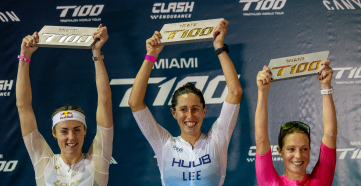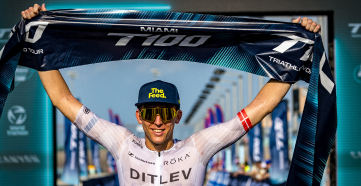In a wide-ranging interview with the Fitter Radio Podcast, Team Internationals captain Craig Alexander spoke openly about a number of topics including this summer’s Collins Cup.
The landmark event, scheduled to take place in August in the Slovakian town of Šamorín, pits 36 of the world’s greatest endurance athletes in a competition like no other.
Twelve individual races, pitting members of Team Europe, Team Internationals and Team USA, will see the sport’s best face off in mouthwatering head-to-head-to-head showdowns.
Alexander going ‘Full Monty’ on Collins Cup
Craig has had the opportunity to run the rule over several Team Internationals hopefuls as preparations begin for the Collins Cup.
“The Collins Cup just seemed to me like it was unique for us,” the three-time IRONMAN World Champion explained.
“I thought, you know, that’s interesting. I always used to like to watch some of those team tournaments. I’d watch the Davis Cup in Tennis because I just found that element of team and the tactics and the dynamics quite interesting.”
So, when the Australian stalwart heard about the idea to run a ‘Ryder Cup’-style event in the sport he’s competed in for a number of decades, he was eager to get involved.
“The PTO then asked me if I’d be interested in being team captain, and they said they wanted some big names. They’d approached Mark Allen, Karen Smyers, Chrissie Wellington, Normann Stadler, Erin Baker, Simon Whitfield and Lisa Bentley.
“Really great people but also big names in our sport. I was serious about going the ‘Full Monty’, so to speak when it came to the Collins Cup.”

Ruling the roost down under
Alexander is taking his role as Team Internationals Captain very seriously, and he has been looking very closely at recent events Down Under.
Craig had a front-row seat as several Team Internationals candidates did battle at the PTO-supported Big Husky Triathlon in Huskisson in early March.
The 47-year-old was part of the commentary team as the PTO produced live coverage of one of Australia’s iconic triathlons for the first time.
One of the biggest battles of the afternoon was between two women on the periphery of automatic selection – Ellie Salthouse and Amelia Watkinson.
“At Huskisson, I was watching a little battle between Amelia and Ellie, because they’re just on the fringe of the rankings.
“I think part of being a captain is understanding where the athletes are in terms of their training cycle when they race. For example, Amelia had just come out of a two-week quarantine before Huskisson, so her race preparation may have hampered.
“It’s not for me to make excuses for the athletes, and they certainly don’t need me to make excuses for them.
“But I have to come in with that sort of unbiased, unfiltered look and understand from a performance standpoint where the athletes are.”
“As we get closer and closer to August, more and more racing gets scheduled and these athletes build form and build momentum. I must pay attention, because we want to pick the best team we can.”

Tactical selections key
One tantalising aspect of the Collins Cup format is the tactics which can be employed during the event, and that is something Alexander has already given much thought to.
“It’s not going to be the big groups that we tend to get into,” the Australian said as he explained some of the differences between the Collins Cup and an individual triathlon event.
“The dynamic could be a little different, for example It might be harder to hold the feet in the swim with just three athletes in the race.
“You’re really looking at athletes who, for one reason or another, might slide under the radar because that group dynamic doesn’t help them.
“They might be a great swimmer and an unbelievable biker, but not an outstanding runner – they could benefit from a three-individual race,
“You need to take all these things into consideration because it’s not going to be a field of 55 on the start line, which you see in some of the bigger races. It’s going to be three guys or three girls.
“Different racing, different dynamic. I think as a captain, you have to pay attention to those things.
“In the week leading up to the actual event, captains will need to understand their athletes and where they are and their place in the format at that point in time, and chat to them about potential matchups that they’re interested in.
“I think that’s all going to come into play. There is a lot for us as captains to think about.”

No-one is out of the reckoning
One point Alexander was keen to emphasise over the coming months was a very simple one – everybody will be considered for selection.
With a year of disruption and cancellations during 2020, several athletes have spent the last 12 months without significant competitive action.
One such athlete is Jodie Stimpson. The double Commonwealth Games gold medallist returned to action at CHALLENGEMIAMI® after a long absence, and took the race by storm.
She outpaced several PTO World Ranked top 10 triathletes on her way to victory at the Homestead-Miami Speedway, and is now a contender to make the Team Europe squad.
Alexander expects further athletes outside the upper echelons of the PTO World Rankings to stake their claims for the Collins Cup in the coming months.
“I don’t want any athlete to think that because they are not a name people have heard of, that they’re not in the reckoning. Everybody is in the reckoning; you have just got to get the runs on the board.
“You know, I noticed Nick Kastelein was back racing in Miami and he is a guy a couple of years ago, he had a fifth or sixth at the 70.3 World Championship, and I know he won an IRONMAN.
“He’s had some injuries, and I know he doesn’t have the world ranking as he hasn’t raced much the last 18 months – there’s a lot of examples.
“We have to be paying attention because although the rankings are excellent, they don’t tell the whole story.
“Any athlete out there, I would just say fire up and get some get some good results, because the captains are watching.”


















